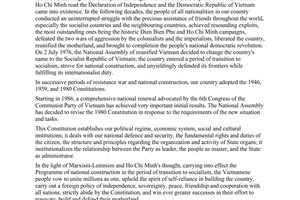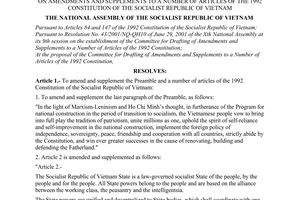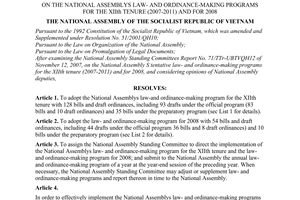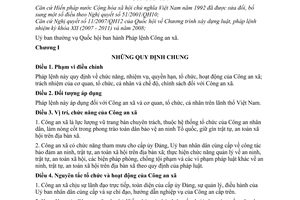Nội dung toàn văn Ordinance No. 06/2008/PL-UBTVQH12 of November 21, 2008, on Commune Police
|
THE
NATIONAL ASSEMBLY STANDING COMMITTEE |
SOCIALIST
REPUBLIC OF VIET NAM |
|
Hanoi, November 21, 2008 |
ORDINANCE
ON COMMUNE POLICE
Pursuant to the 1992
Constitution of the Socialist Republic of Vietnam, which was amended and
supplemented under Resolution NO.51/2001/QHI0;
Pursuant to Resolution No. 11/2007/QH12 of the National Assembly on the law-
and ordinance- making programs in its XlIth term (2007-2011) and 2008;
The National Assembly Standing Committee promulgates the Ordinance on Commune
Police.
Chapter I
GENERAL PROVISIONS
Article 1. Governing scope
This Ordinance provides for the functions, tasks, powers, organization and operations of Commune Police, the responsibilities of agencies, organizations and individuals and the regimes and policies towards Commune Police.
Article 2. Subjects of application
This Ordinance applies to Commune Police and agencies, organizations as well as individuals in the Vietnamese territory.
Article 3. Status and functions of Commune Police
1. Commune Police constitutes a part-time armed force in the organizational system of the People's Police, acting as the core in the movement "All people protect national security and maintain social order and safety" in communes.
2. Commune Police functions to advise Party Committees and People's Committees of the same level on the maintenance of security, social order and safety in communes; to manage security, social order and safety and apply measures to prevent and combat crimes and other law violations related to security, social order and safety in communes according to law.
Article 4. Principles on organization and operations of Commune Police
1. Commune Police submits to the direct and all-sided leadership of Party Committees, the management and administration of People's Committees of the same level, and the professional direction and guidance of the superior police.
2. Commune Police operations comply with the Constitution and laws and the principle that the subordinates submit to the superiors; its operations rely on people and are subject to people's supervision.
Article 5. Building of the Commune Police force
1. Vietnamese citizens who are fully qualified in terms of political and ethical quality, educational level and health under the Government's regulations and have aspirations and gifts for police activities may be considered and recruited into Commune Police.
2. The State adopts policies to prioritize the building, training, fostering and stable use of the Commune Police force; applies preferential treatment regimes and ensure conditions for operations of Commune Police.
3. Agencies, organizations, people's armed force units and all citizens are obliged to participate in building the Commune Police force.
Article 6. Supervision of Commune Police operations
1. National Assembly agencies, groups of National Assembly deputies, National Assembly deputies, People's Councils and People's Council deputies at all levels shall, within the ambit of their tasks and powers, supervise the implementation of the law on commune police.
2. Vietnam Fatherland Front and its member organizations shall coordinate and cooperate with, and assist Commune Police in performing its tasks; supervise Commune Police operations; encourage people of all strata to participate in the "All people protect national security" movement.
Article 7. Coordination between Commune Police and agencies, organizations, individuals, and people's armed force units in the maintenance of security, social order and safety
1. Commune Police shall assume the prime responsibility for, and coordinate with militia and self-defense forces, People's Army and People's Police units, agencies and organizations in communes in, performing the tasks of protecting security, social order and safety in communes.
2. People's armed force units, agencies, organizations and individuals in communes have the responsibility to coordinate and cooperate with, and assist Commune Police in performing its tasks.
Article 8. Prohibited acts
1. Organizing and employing the Commune Police force in contravention of this Ordinance.
2. Using the Commune Police's name for wrongdoings.
3. Opposing or obstructing Commune Police members on duty.
4. Illegally producing, trading or using weapons, support instruments, uniforms and insignia of Commune Police.
5. Taking advantage of Commune Police tasks and powers to cause troubles or harassment to bribe to people, infringe upon the interests of the State or the lawful rights and interests of organizations or individuals.
6. Other law-breaking acts related to the organization or operations of Commune Police.
Chapter II
TASKS, POWERS AND ORGANIZATION OF COMMUNE POLICE
Article 9. Tasks and powers of Commune Police
1. To grasp the situation of security, social order and safety in communes, propose to Party Committees and People's Committees of the same level and superior police offices policies, plans and measures to ensure security, social order and safety and organize the implementation thereof.
2. To act as the core in building up the "All people protect national security" movement; to propagate and disseminate guidelines, policies and the law on security, social order and safety; to guide, inspect and urge its according to competence agencies, organizations and individuals in the implementation of law on security, social order and safety in communes.
3. To advise commune People's Committees and organize the implementation of legal provisions on management and education of persons liable to probation or non-custodial reform and persons on suspended sentence who reside in communes; to manage persons under special amnesty, drug-detoxified persons and persons having completely served their prison terms and being subject to further management according to law.
4. To assume the prime responsibility for, and coordinate with agencies, organizations and other forces in. warding off. detecting and combating crimes and social evils according to law; to protect security, social order and safety, and the lives and property of individuals, agencies and organizations in communes.
5. To enforce the law on residence management, people's identify cards and other travel papers; to manage explosives, weapons and support instruments, to prevent and fight fires, to protect the environment; to perform the security and order-related management of conditional production and business lines in communes under the decentralization and guidance of the Minister of Public Security.
6. To receive, classify and handle according to its competence cases showing signs of violating the law on security, social order and safety in communes; to body-search, check belongings and personal papers and seize weapons or murder weapons of persons who are caught red-handed in committing illegal acts; organize the rescue of victims, protect the scenes and promptly report thereon to competent bodies; to make initial records, take testimonies of victims and witnesses, to seize and preserve material evidences under law and the guidance of the Minister of Public Security; to supply records, documents, material evidences and gathered information and create conditions for competent bodies to verify and handle the cases.
7. To organize the arrest of criminals caught red-handed, wanted or hunted persons lurking about in communes; to escort the arrested persons to immediate superior police offices.
8. To sanction administrative violations; make dossiers proposing the application of other administrative sanctions against violators in communes under law and the guidance of the Minister of Public Security.
9. To request agencies, organizations and individuals in communes to coordinate activities, to supply information and perform tasks related to the maintenance of security, social order and safety.
10. When necessary, to mobilize people and means of organizations and individuals to rescue victims, for salvage and rescue activities, arrest of criminals caught red-handed or wanted or hunted persons and to immediately return the mobilized means when the circumstances terminate and to promptly report thereon to presidents of People's Committees of the same level.
In case of material damage, to pay compensations according to law; if persons mobilized to perform the tasks are wounded or die. they will be entitled to the State's policies.
11. To use weapons, support instruments and apply a number of police measures under law and the guidance of the Minister of Public Security to protect security, social order and safety in communes.
12. To participate in the cadet enrolment and recruitment into the people's armed forces; to conduct drills and exercises in the implementation of schemes on defense, security, salvage, rescue, mitigation of natural disasters and other serious incidents.
13. To build the Commune Police force politically, organizationally and professionally clean and strong.
14. To perform other tasks prescribed by law.
Article 10. Organization of Commune Police
1. Commune Police is composed of a head, deputy heads and members.
Commune police members are arranged in villages or hamlets and perform on-duty tasks at the office or workplace of Commune Police.
2. The Government shall provide for the limit numbers of deputy heads and members of Commune Police.
Based on the Government's prescribed limit numbers and the practical local situation. People's Committees of provinces or centrally run cities (below collectively referred to as provincial level) shall submit to People's Councils of the same level for decision the specific numbers of Commune Police deputy-heads and members in each commune.
3. Heads of the police offices of rural districts, urban districts, towns and provincial cities (below collectively referred to as district level), after consulting commune People's Committee presidents, shall propose presidents of district-level People's Committees to appoint, relieve from duty, transfer or dismiss Commune Police heads; and appoint, relieve from duty or dismiss Commune Police deputy-heads.
Presidents of commune People's Committees shall decide to recognize or relieve from duty Commune Police members at the proposal of Commune Police heads.
4. In case of necessity to protect security, social order and safety as required, directors of provincial-level Police Departments, after consulting presidents of district-level People's Committees, shall decide to appoint officers, non-commissioned officers of the People's Police to hold titles of Commune Police.
5. Commune Police has its own seal.
Article 11. Tasks and powers of Commune Police heads
Commune Police heads shall organize the performance of tasks and powers of Commune Police defined in Article 9 of this Ordinance; take responsibility before law. People's Committees of the same level and superior police offices for operations of Commune Police.
Article 12. Tasks and powers of Commune Police deputy-heads
Commune Police deputy-heads shall assist their respective heads in performing the tasks assigned by their heads; when Commune Police heads are absent. Commune Police deputy-heads will be authorized by their heads to perform the tasks and powers of Commune Police heads.
Article 13. Tasks and powers of Commune Police members
Commune Police members shall perform tasks assigned by their heads; have the responsibility to realize the policies, plans and measures to maintain security, social order and safety in population quarters under their respective charge and perform other security-, social order and safety-maintaining tasks assigned by Commune Police heads.
Chapter III
ASSURANCE OF OPERATIONS OF, AND REGIMES AND POLICIES FOR COMMUNE POLICE
Article 14. Assurance of funds and material foundations for Commune Police operations
The funding sources for Commune Police operations include central budget and local budget.
The State ensures funds and material foundations for operations, training, drills, fostering, regimes, policies and other necessary conditions for Commune Police.
The Government shall specify budget funds to ensure Commune Police operations.
Article 15. Workplaces and equipment of Commune Police
Commune Police has its own office or workplace suitable to the working conditions and requirements to maintain security, social order and safety in localities.
Commune Police is equipped with weapons, support instruments, dossiers, books, notebooks and other necessary facilities and means for the performance of tasks as provided for by law.
Weapons, support instruments and equipment of Commune Police must be registered, managed and used under law and the guidance of the Minister of Public Security.
Article 16. Commune Police uniforms, insignia and certificates
Commune Police heads, deputy-heads and members will be supplied with Commune Police uniforms, insignias and certificates according to the Government's regulations.
Article 17. Training, drilling and retraining Commune Police
Commune Police heads and deputy-heads must be trained and retrained according to the Government's regulations.
Annually. Commune Police heads, deputy-heads and members must be trained and retrained in political, legal and professional knowledge under programs set by the Minister of Public Security.
Article 18. Salaries and allowances for Commune Police
1. Commune Police heads enjoy salaries and allowances prescribed by law.
2. Commune Police deputy-heads and members enjoy monthly allowances. The Government shall prescribe the allowance brackets applicable to Commune Police deputy-heads and members. Provincial-level People's Committees shall, based on the Government's regulations and local realities, submit to People's Councils of the same level for decision specific allowance levels.
Article 19. Regimes and policies towards Commune Police
1. Commune Police heads, deputy-heads and members shall pay social insurance and health insurance premiums according to law.
2. Commune Police heads enjoy a seniority allowance if they work for 60 consecutive months or more or a lump-sum allowance if they work for 15 consecutive years but give up their jobs for plausible reasons while being not fully qualified for retirement.
3. Commune Police deputy-heads and members enjoy a lump-sum allowance if they work for 15 consecutive years or more but give up their jobs for plausible reasons.
4. Commune Police deputy-heads and members, when being sent for full-time training, drills, political, legal and professional retraining, enjoy an allowance equal to a basic food ration of a combatant serving for a definite time in the People's Police; when they are sent on mission, they are entitled to travel expenses.
5. Commune Police heads, deputy-heads and members, when on duty for combat readiness in key areas w=here the security- and order-related situation is complicated, are entitled to the prescribed regimes.
6. Commune Police heads, deputy-heads and members who get wounded or lay down their lives while on duty are entitled to the law-prescribed regimes and policies on preferential treatment of people with meritorious services to the revolution; incumbent Commune Police deputy-heads and members, if getting sick, are entitled to medical examination and treatment at healthcare establishments and considered for medical examination and treatment cost supports from the local budgets.
The Government shall specify this Article.
Chapter IV
RESPONSIBILITIES FOR STATE MANAGEMENT OF COMMUNE POLICE
Article 20. State management of Commune Police
1. The Government performs the unified state management of Commune Police.
2. The Ministry of Public Security shall take responsibility before the Government for performing the state management of Commune Police.
Article 21. Responsibilities of the Ministry of Public Security
1. To submit to the Government for promulgation or to promulgate according to its competence and organize the implementation of, legal documents on Commune Police.
2. To specify and direct the appointment of People's Police officers or non-commissioned officers to hold titles of Commune Police.
3. To define programs, contents and time for, and organize training, political, legal and professional retraining for Commune Police.
4. To provide professional direction and guidance for Commune Police; to prescribe the quantity and types of weapons, support instruments and equipment for Commune Police and guide the management and use thereof.
5. To direct, guide and inspect People's Committees at all levels in the management and building of the Commune Police force, the provision of working conditions for Commune Police and the implementation of regimes and policies towards Commune Police heads, deputy-heads and members.
6. To examine, inspect and settle complaints and denunciations; to award commendations and rewards and handle violations as provided for by law; to suspend or cancel according to its competence or propose competent authorities to suspend or cancel regulations on Commune Police which are contrary to law.
Article 22. Responsibilities of ministries and ministerial-level agencies
Ministries and ministerial-level agencies shall, within the ambit of their powers, coordinate with the Ministry of Public Security in performing the state management of Commune Police according to this Ordinance and other relevant laws.
Article 23. Responsibilities of People's Committees at all levels
People's Committees at all levels shall, within the ambit of their tasks and powers, perform the state management of Commune Police under this Ordinance and other relevant laws, including:
1. Organizing the propagation, dissemination and education of the law on commune police;
2. Organizing the implementation of the law on commune police;
3. Performing the functions of managing and directing the organization and operations of Commune Police according to their competence and under the guidance of superior police offices; to arrange offices or workplaces for Commune Police; to provide funds for Commune Police operations and implement regimes and policies towards Commune Police heads, deputy-heads and members;
4. To examine, inspect, and settle complaints and denunciations; to award commendations and rewards and handle violations according to law.
Chapter V
IMPLEMENTATION PROVISIONS
Article 24. Effect
1. The provisions of this Ordinance apply to the police forces of district townships where the regular police forces are not yet organized.
2. This Ordinance takes effect on July 1,2009.
Article 25. Implementation detailing and guidance
The Government and competent agencies shall detail and guide the implementation of articles and clauses of this Ordinance assigned to them; and guide other necessary contents of this Ordinance with a view to meeting state management requirements.
|
|
ON
BEHALF OF THE NATIONAL ASSEMBLY STANDING COMMITTEE CHAIRMAN |



